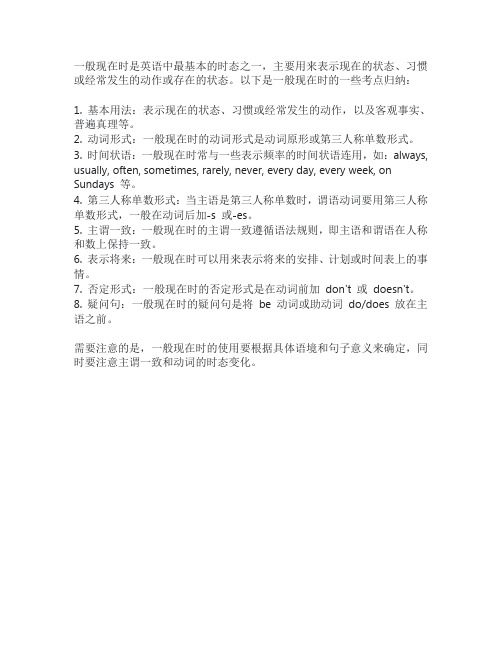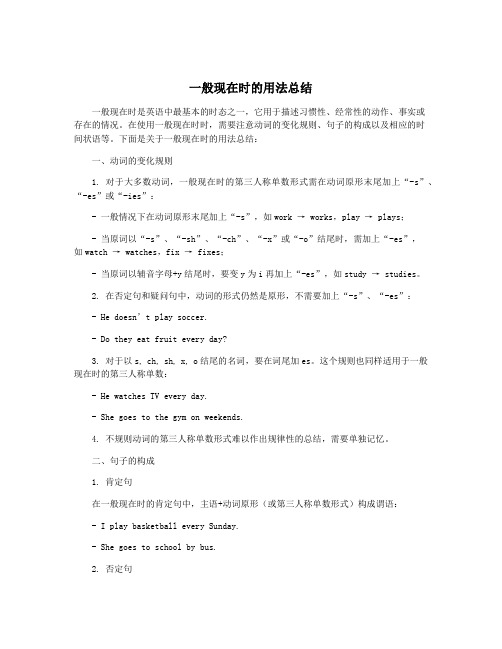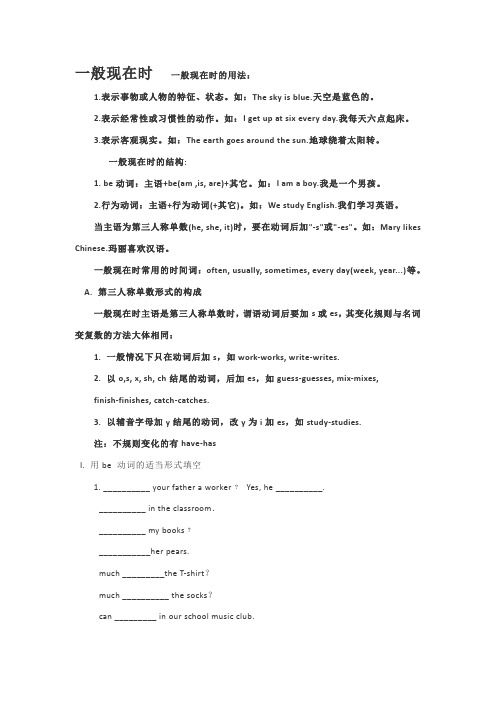一般现在时基本用法
一般现在时的基本用法

一般现在时的基本用法
一般现在时,是一种英语语法形式。
表示通常性、规律性、习惯性、真理性(即事实)的动作或状态,或者动作有时间规律发生的事件的一种时间状态。
一般现在时的基本用法有:
1.表示经常发生的动作或者经常存在的状态,经常和表示时间的状语often,
always,usually,sometimes,every day等连用。
2.表示某种习惯或者能力,也可以表示职业、特征等。
3.表示客观事实、客观规律或者客观真理。
4.在时间、条件、让步等状语从句中,表示将来的动作。
一般现在时的基本结构是:
1.主语+谓语+其他(表动作)。
2.主语+be(am,is,are)+表语(形容词、名词充当表语)。
当主语是第三
人称单数时,动词变相应的第三人称单数形式。
例句:
1)I am a student.(主语+be动词+名词)
2)They are hungry.(主语+be动词+形容词)
3)He is out.(主语+be动词+副词)
4)That pen is mine.(主语+be动词+代词)
5)I am fifteen.(主语+be动词+数词)
6)The bike is under the tree.(主语+be动词+介词短语)。
一般现在时考点归纳

一般现在时是英语中最基本的时态之一,主要用来表示现在的状态、习惯或经常发生的动作或存在的状态。
以下是一般现在时的一些考点归纳:
1. 基本用法:表示现在的状态、习惯或经常发生的动作,以及客观事实、普遍真理等。
2. 动词形式:一般现在时的动词形式是动词原形或第三人称单数形式。
3. 时间状语:一般现在时常与一些表示频率的时间状语连用,如:always, usually, often, sometimes, rarely, never, every day, every week, on Sundays 等。
4. 第三人称单数形式:当主语是第三人称单数时,谓语动词要用第三人称单数形式,一般在动词后加-s 或-es。
5. 主谓一致:一般现在时的主谓一致遵循语法规则,即主语和谓语在人称和数上保持一致。
6. 表示将来:一般现在时可以用来表示将来的安排、计划或时间表上的事情。
7. 否定形式:一般现在时的否定形式是在动词前加don't 或doesn't。
8. 疑问句:一般现在时的疑问句是将be 动词或助动词do/does 放在主语之前。
需要注意的是,一般现在时的使用要根据具体语境和句子意义来确定,同时要注意主谓一致和动词的时态变化。
一般现在时的用法总结

一般现在时的用法总结一般现在时是英语中最基本的时态之一,它用于描述习惯性、经常性的动作、事实或存在的情况。
在使用一般现在时时,需要注意动词的变化规则、句子的构成以及相应的时间状语等。
下面是关于一般现在时的用法总结:一、动词的变化规则1. 对于大多数动词,一般现在时的第三人称单数形式需在动词原形末尾加上“-s”、“-es”或“-ies”:- 一般情况下在动词原形末尾加上“-s”,如work → works,play → plays;- 当原词以“-s”、“-sh”、“-ch”、“-x”或“-o”结尾时,需加上“-es”,如watch → watches,fix → fixes;- 当原词以辅音字母+y结尾时,要变y为i再加上“-es”,如study → studies。
2. 在否定句和疑问句中,动词的形式仍然是原形,不需要加上“-s”、“-es”:- He doesn’t play soccer.- Do they eat fruit every day?3. 对于以s, ch, sh, x, o结尾的名词,要在词尾加es。
这个规则也同样适用于一般现在时的第三人称单数:- He watches TV every day.- She goes to the gym on weekends.4. 不规则动词的第三人称单数形式难以作出规律性的总结,需要单独记忆。
二、句子的构成1. 肯定句在一般现在时的肯定句中,主语+动词原形(或第三人称单数形式)构成谓语:- I play basketball every Sunday.- She goes to school by bus.2. 否定句在一般现在时的否定句中,需在助动词“do”(或“does”)和动词原形之间加上“not”构成否定形式:- I do not play tennis on Mondays.- He does not like coffee.也可以用缩写形式来构成否定句,即使用助动词的缩写形式+not,如doesn’t, don’t:- She doesn’t go to the gym on weekends.- They don’t watch TV in the morning.3. 疑问句在一般现在时的疑问句中,需将助动词“do”(或“does”)置于主语之前构成疑问句:- Do you like swimming?- Does she speak Chinese?与否定句类似,也可以使用助动词的缩写形式来构成疑问句:- Do they go to the library every day?- Does he play the guitar?4. 特殊疑问句对于一般现在时的特殊疑问句,需要用疑问词来引导,并按照一般疑问句的结构构成句子。
小学英语语法 一般现在时

小学英语语法一般现在时一般现在时基本用法介绍【No。
1】一般现在时的功能1。
表示事物或人物的特征、状态。
如:The sky is blue。
天空是蓝色的。
2。
表示经常性或习惯性的动作。
如:I get up at six every day。
我天天六点起床。
3。
表示客观现实。
如:The earth goes around the sun。
地球绕着太阳转。
一般现在时的构成1。
be动词:主语be 其它。
如:I am a boy。
我是一个男孩。
2。
行为动词:主语行为动词。
如:we study English。
我们学习英语。
当主语为第三人称单数时,要在动词后加“-s”或“-es”。
如:Mary likes Chinese。
玛丽喜欢汉语。
【No。
2】一般现在时的变化1。
be动词的变化。
否定句:主语be not 其它。
如:He is not a worker。
他不是工人。
一般疑问句:Be 主语其它。
如:-Are you a student?-Yes。
I am。
/ No,I‘m not。
非凡疑问句:疑问词一般疑问句。
如:where is my bike?2。
行为动词的变化。
否定句:主语don’t 动词原形。
如:I don’t like bread。
当主语为第三人称单数时,要用doesn‘t构成否定句。
如:He doesn’t often play。
一般疑问句:Do 主语动词原形其它。
如:- Do you often play football?- Yes,I do。
/ No,I don‘t。
当主语为第三人称单数时,要用does构成一般疑问句。
如:- Does she go to work by bike?- Yes,she does。
/ No,she doesn’t。
动词s的变化规则1.一般情况下,直接加-s,如:cook-cooks,milk-milks2.以s。
x。
sh。
ch。
o结尾,加-es,如:guess-guesses,wash-washes,watch-watches,go-goes3.以“辅音字母y”结尾,变y为i,再加-es,如:study-studies。
一般现在时的语法知识点

一般现在时的语法知识点一般现在时是英语中最基本的时态之一,用于描述当前正在进行的动作、习惯性的行为、客观事实以及普遍真理等。
本文将介绍一般现在时的语法知识点及其应用。
一、一般现在时的构成一般现在时的肯定句结构为“主语+ 动词原形(第三人称单数加-s)+ 其他”,例如:“I eat breakfast every day.”(我每天吃早餐)否定句结构为“主语+ 动词原形+ not + 其他”,例如:“She does not like coffee.”(她不喜欢咖啡)疑问句结构为“助动词(do/does) + 主语+ 动词原形+ 其他”,例如:“Do you play football?”(你踢足球吗?)二、一般现在时的用法1. 描述习惯性的行为或经常发生的动作。
例如:“He brushes his teeth twice a day.”(他每天刷两次牙)2. 表示客观事实或普遍真理。
例如:“Water boils at 100 degrees Celsius.”(水在100摄氏度沸腾)3. 描述当前正在进行的动作。
例如:“I am studying English now.”(我现在正在学英语)4. 表示经常、总是或一直发生的动作。
例如:“She always arrives on time.”(她总是准时到达)三、一般现在时的时间状语时间状语在句子中用来表示动作发生的时间,常见的时间状语有:always(总是)、often(经常)、usually(通常)、sometimes (有时候)、every day/week/month/year(每天/每周/每月/每年)等。
例如:“I often go to the gym.”(我经常去健身房)“They usually have dinner at 7 o'clock.”(他们通常7点吃晚饭)四、一般现在时的注意事项1. 第三人称单数形式的动词要加上-s。
一般现在时用法

一般现在时用法第一讲1. be动词be(am,is,are)be 的用法口诀:我用am,你用are,第三人称他,她,它。
单数名词用is,复数名词全用are。
变疑问,往前提,句末问号莫丢弃。
变否定,更容易,be后加not莫忘记。
疑问否定任你变,句首大写莫迟疑。
2、行为动词+s的变化规则(1)一般情况下,直接加-s,如:cook-cooks, get-gets, play- plays, run-runs(2) 以s. x. sh. ch. o结尾,加-es,如:guess-guesses, wash-washes, watch-watches, go-goes,do-does;(3)以“辅音字母+y”结尾,去y 再加-ies,如:study-studies,fly-flies第二讲一般现在时基本用法介绍:1、一般现在时的功能:(1) 表示事物或人物的特征、状态。
如:The sky is blue.天空是蓝色的。
(2) 表示经常性或习惯性的动作。
如:I get up at six every day.我每天六点起床。
经常与频度副词 never,seldom, sometimes, often, usually, always, every morning , on Sunday 等等连用。
(3) 表示客观现实。
如:The earth goes around the sun.地球绕着太阳转。
2、一般现在时的构成:(1) be动词:主语+be(am,is,are)+其它。
如: I am a boy.我是一个男孩。
(2) 行为动词:主语+行为动词(+其它)。
如:We study English.我们学习英语。
当主语为第三人称单数(he, she,it)时,要在动词后加"-s"或"-es"。
如:Mary likes Chinese.玛丽喜欢汉语。
‘ 第三讲一般现在时的变化:1. be动词的变化。
一般现在时的用法

一般现在时的用法一般现在时是英语中最基本、最常用且最常见的时态之一。
它用于描述现实状态、经常性的行为、常规性的事实以及普遍真理。
本文将针对一般现在时的用法进行详细论述。
1. 描述现实状态:一般现在时常用来描述客观存在的情况或可观察到的事物特征。
例如:- The sky is blue.(天空是蓝色的。
)- Water boils at 100 degrees Celsius.(水在100摄氏度沸腾。
)- I live in New York.(我住在纽约。
)2. 经常性的行为:一般现在时可以用来描述经常性或习惯性的行为,这些行为在现在发生,过去发生,将来也可能发生。
常用的时间状语词包括:usually (通常)、often(经常)、always(总是)、sometimes(有时候)等。
例如:- I usually go to bed before 11 pm.(我通常在晚上11点前上床睡觉。
)- They often play basketball on weekends.(他们经常在周末打篮球。
)3. 常规性的事实:一般现在时还常用来表达惯常性的事实或自然规律。
例如:- The sun rises in the east.(太阳从东方升起。
)- Cats like to play with balls of yarn.(猫喜欢玩线球。
)4. 普遍真理:一般现在时还可以用来表达普遍真理或普遍认可的事实。
常用的短语包括:everyone knows that...(大家都知道...)、it is believed that...(人们相信...)、it is said that...(据说...)等。
例如:- Birds fly.(鸟儿会飞。
)- It is said that honesty is the best policy.(人们说,诚实是最好的策略。
)总结:一般现在时的用法适用于描述现实状态、经常性的行为、常规性的事实以及普遍真理。
一般现在时 一般现在时的用法

一般现在时一般现在时的用法:1.表示事物或人物的特征、状态。
如:The sky is blue.天空是蓝色的。
2.表示经常性或习惯性的动作。
如:I get up at six every day.我每天六点起床。
3.表示客观现实。
如:The earth goes around the sun.地球绕着太阳转。
一般现在时的结构:1. be动词:主语+be(am ,is, are)+其它。
如:I am a boy.我是一个男孩。
2.行为动词:主语+行为动词(+其它)。
如:We study English.我们学习英语。
当主语为第三人称单数(he, she, it)时,要在动词后加"-s"或"-es"。
如:Mary likes Chinese.玛丽喜欢汉语。
一般现在时常用的时间词:often, usually, sometimes, every day(week, year...)等。
A. 第三人称单数形式的构成一般现在时主语是第三人称单数时,谓语动词后要加s或es,其变化规则与名词变复数的方法大体相同:1. 一般情况下只在动词后加s,如work-works, write-writes.2. 以o,s, x, sh, ch结尾的动词,后加es,如guess-guesses, mix-mixes,finish-finishes, catch-catches.3. 以辅音字母加y结尾的动词,改y为i加es,如study-studies.注:不规则变化的有have-hasI. 用be 动词的适当形式填空1. __________ your father a worker﹖Yes, he __________.__________ in the classroom.__________ my books﹖___________her pears.much _________the T-shirt?much __________ the socks?can _________ in our school music club.'s ___________friends.and I _________friends.12. There ____ some apples on the table yesterday.IV.用所给词的正确形式填空。
- 1、下载文档前请自行甄别文档内容的完整性,平台不提供额外的编辑、内容补充、找答案等附加服务。
- 2、"仅部分预览"的文档,不可在线预览部分如存在完整性等问题,可反馈申请退款(可完整预览的文档不适用该条件!)。
- 3、如文档侵犯您的权益,请联系客服反馈,我们会尽快为您处理(人工客服工作时间:9:00-18:30)。
一般现在时基本用法1.一般现在时的构成形式如下:肯定式疑问句否定式疑问否定式I work Do i work ? I do not work Do i not work?We work Do we work? We do not work Do we not work? You work Do you work? You do not work Do you not work? They work Do they work? They do not work Do they not work?2.一般现在时的基本用法①一般现在时常表示经常发生的动作或经常存在的状态如:I go to school every day.我每天上学。
②表示此状态时,常和always,often,usually,everyday,sometimes等表示时间的状语连用,有时候时间状语可以不表示出来如:Where do you live?你住在哪里?③由when ,while,before,after,until,as soon as 等引导的时间状语从句亦可用一般现在时态表示经常发生的动作或是状态。
如:Make hay while the sun shines.要趁热打铁一般现在时常用于以下情况表日常行为:如:The boy wake up at seven a'clock,wash ,dress quickly and run intothe dining room for breakfast. They wait until they hear the bell and then go to school.这些男孩7点起床,洗漱完毕,很快地穿好衣服,就到食堂去用早餐,然后等上课铃一响就去上课。
表习惯,能力等:如:Do you drive, Joho?Joho,你会开车吗?表客观存在:如:Fire burns火会燃烧(表客观事实)The earth moves round the sun.地球围绕太阳旋转(表客观真理)报纸,杂志,书籍不强调过去时间,单纯表示客观事实(即所载文字依然存在)时候,也可用一般现在时态如:What does the newspaper say? (是什么时候的练习题目吧)今天报纸说些什么?二、单三人称形式易出错例:1 He plaies (play) football very well.2 Danny gos (go) to school at 7:10.答案:1 plays 2 goes解析:1以辅音字母加y结尾的动词变单三人称形式才能把y换成i再加es;2与名词变复数不同,变单三人称形式以o结尾的词要加es.三、在句式变换时易出错例:1 Does Jenny has (has) a good friend?2 Brian doesn’t lives (not live) in China.答案:1 Does have 2 doesn’t live解析:单三人称做主语的一般现在时做句式变化时,可记住如下口诀:“见助动,用原形”。
此口诀也可推广用于一般过去时态中。
e.g. He didn't go home yesterday.四、对do的理解易出错例:We don’t (not do) our homework in the afternoon.答案:don’t do解析:do是一个比较难理解的词,它有三个含义:a)是所有行为动词的总称;b)是助动词,无实义;c)是一个具体的行为动词“做,干”。
此句中给出的do指“做,干”,not指把此句变为否定句,故须在do 前加助动词don’t。
五、对主语的数判断有误例:Li Ming with me are (be) in Beijing.答案: is解析:表面一看是“我和李明两个人在北京”,但with在此做伴随状语,不能做主语,故用is.另外,宾语从句中,从句部分若是表示客观真理,不管主句是何时态,从句都要用一般现在时;在时间和条件状语从句中,主句表将来,从句要用一般现在时。
一般现在时用法专练(A)Ⅰ.用括号内动词的适当形式填空。
1. He often (have) dinner at home.2. Daniel and Tommy (be) members of the Reading Club.3. She and I (take)a walk together every evening.4. There (be) some water in the bottle.5. We (not watch) TV on weekdays.6. Nick (not do) his homework on Sundays.7. they (like) the World Cup?8. What they usually (do) on holidays?9. your parents (read) newspapers every day?10. The girl (teach) us English on Sundays.Ⅱ.按照要求改写句子。
1. Daniel watches TV every evening.(改为否定句)Daniel TV every evening.2. I do my homework every day .(改为一般疑问句并作否定回答)——you homework every day?——No,I .3. She likes milk.(改为一般疑问句并作肯定回答)——she milk?——Yes.,she .4. Simon is from Beijing.(同义句改写)Simon Beijing.5. Millie is clever at Maths.(同义句改写)Millie Maths .Ⅲ.改错。
1. Is you brother speak English?A B C ( )2. Does he looks like his father?A B C ( )3. He likes play games after class.A B C ( )4. Mr Wu teachs us English.A B C ( )5….She doesn’t her homework on Sundays.A B C ( )Ⅳ.将下列句子译成英文。
1._桑迪放学后打羽毛球吗?不.她学习很用功.放学后她总是看书.._ Sandy badminton after school?No.She hard.She always books after school.2.他在第三中学上学.他每天早上七点上学.He in No .3 Middle School. He to school at day .3.父亲早晨送我到学校.My father me to school in the morning.4. 我女儿喜欢看电视和听音乐..My daughter TV and to music.5. 西蒙朋友的姐姐长大后想当一位歌手.Simon’s friend’s sister to a singer when she up.般现在时用法专练(B)1. 按要求改写下列句子.1、Sandy has long hair in a ponytail. (改为一般疑问句并作肯定回答)Sandy long hair in a ponytail?Yes , .2、Simon and Daniel are good friends .(改为否定句)Simon and Daniel ______ good friends.3、We are in the school football team. (改为一般疑问句并作肯定回答)you in the school football team? Yes, ..4、Amy likes playing computer games. (改为一般疑问句并作否定回答)________ Amy ________ playing computer games? No, ________________.5、We go to school every morning . (改为否定句)We ________ ________ to school every morning.6、She is always ready to help others. (改为一般疑问句并作否定回答)________ she always ready to help others? No, ________ ________. 7、 The earth goes around the sun. (改为一般疑问句并作肯定回答)________ the earth ________ around the sun? Yes, ________________.8、He speaks English very well. (改为否定句)He ________ speak English well.9、John comes from Canada.(对划线部分提问)Where ________John ________ from?10、I like taking my dog for a walk after suppeWhat ________ you ________ ________ after supper?.二. 改错1. Lily and Lucy doesn’t want to clean the blackboard.2. Mr Green likes work in China very much.3. My mother often go to the shop on Sundays.4. She doesn’t likes bread or cakes.5. Where is Jim and Kate now?6. There are some water and leaves in the pool.7. Please give a colour pencil for me.8. They aren’t go to school at the weekend.9. The dog sits between the chair.10. She often works hard and goes to bed in night.11. Millie is good in English. She speaks English well.12. She is a member at the Computer Club.13. Do you help your mother in the housework.?14. Do Simon often go home by a bus? .15. I often take bus to school.16. Do you want to play with us after the school?17. Daniel and David want to play on us.18. There is a lots of water in the bottle.19. Wendy has much friends in class.20. There are so lots of people in the hall.一般现在时用法专练(C)一用所给动词正确形式填空1. He loves ______________ (read )newspaper.2. Nick goes ______________ (swim )every Saturday afternoon.3. Simon enjoys______________ (play )football.4. Mr Mu likes ______________( walk) after school.5. Amy likes ______________ (talk) on the phone with her friends.6. Simon usually goes ______________ (run) for half an hour.7. Sandy enjoys ______________ (look )for things on the Internet.8. I don’t like ______________ (dance).9. Eric is a member of the ______________ (read) Club.10. It’s a fine day. What about ______________( play) badminton in the park?二用适当的介词填空1. I go to school _________ my friends.2. Daniel is clever _________English.3. Millie takes Eddie _________a walk every afternoon..4. Kitty lives _________a flat _________Beijing.5. Sandy sits _________Kitty and Amy.6. Here is a picture _________my family. Do you want to look _________it?7. Does Simon often eat _________a restaurant?8. _________ the weekend, Wendy and Kitty play tennis _________an hour.9. Sandy has black hair _________ a ponytail. Kitty has long black hair _________ bunches.10. Mr Smith comes _________ New York. He is American.一、单选1 Jenny ____ in an office. Her parents ____in a hospital.A work worksB works workC work are workingD is working work2 One of the boys_____ a black hat.A haveB there isC there areD has3 We will go shopping if it____ tomorrow.A don't rain Bdidn't rain Cdoesn't rain Disn't rain4 He said the sun ____in the east and ____in the west.A rose; setB rises; setsC rises, setD rise; sets5 Wang Mei ____ music and often ____ to music.A like; listenB likes; listensC like; are listeningD liking ;listen6 Jenny____ English every evening.A has studyB studiesC studyD studied二、填空1 I can take Li Ming there when he _____ ( come) to visit.2 _____your sister_____(know)English?3Her home____ _____ ______(远离)her school.4The pot_____(not look) like yours very much.5 Where _____you____(have)lunch every day?6 Who_____(想要)to go swimming?7 ______she_____(do) the housework every day?8 Jenny and Danny usually______(play) games in the afternoon .答案:1 comes 2 Does know 3 is away from 4 doesn't look5 do have6 wants7 does do8 play二、用所给动词的正确形式填空。
